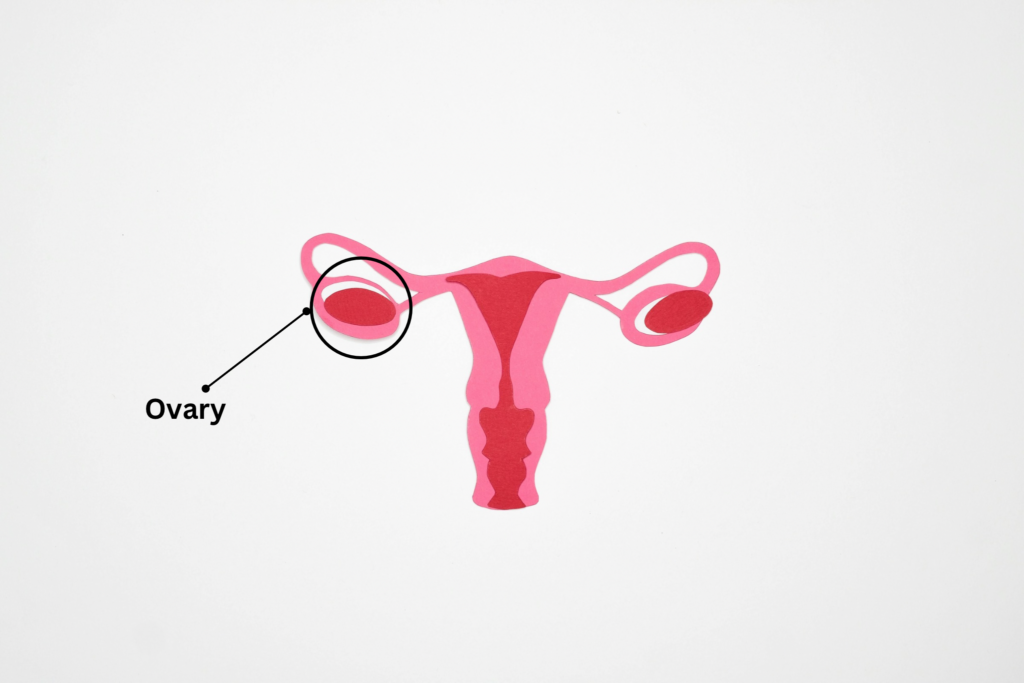
Ovarian cancer symptoms to be aware of
In this article
What's the lowdown?
Ovarian cancer is difficult to catch early because its symptoms often mimic common conditions like IBS or fibroids.
Look out for persistent symptoms like bloating, feeling full quickly, frequent urination, and tummy pain – especially if they happen more than 12 times a month.
Trust yourself – if something feels off, get checked out by your doctor. Early detection makes all the difference!
What is ovarian cancer?
Did you know there are five gynaecological (female reproductive organ) cancers? Anyone with female reproductive organs needs to know about them. That way we can look after ourselves and catch any symptoms early!
Ovarian cancer is cancer of the ovaries, where eggs are released from in the female reproductive system. It’s the sixth most common cancer in people with ovaries.1 Certain ovarian cancers can start in the fallopian tubes (the tubes that carry eggs from the ovary into the uterus) then spread to the ovaries.2

The body is made up of cells and these cells work together to form organs, skin, bones and every other part of the body. However, sometimes these cells malfunction. They can go off the rails, ignore other cells in the body and grow uncontrollably. This is how cancer happens.3
Stages of ovarian cancer
Stages of ovarian cancer are measures of how far the cancer has spread:
- Ovarian cancer means the cancer is within the ovaries only
- Ovarian cancer means the cancer is within the ovaries and the surrounding area within the pelvis
- Ovarian cancer means the cancer has spread into more of the abdomen and lymph nodes
- Ovarian cancer means the cancer has spread to other areas of the body quite far away from the ovaries5
What are the symptoms of ovarian cancer?
Ovarian cancer can be sneaky – it’s tricky to catch ovarian cancer early because its symptoms often mimic common conditions and it’s hard to know the difference between IBS (irritable bowel syndrome) or ovarian cancer, fibroids, polycystic ovary syndrome (PCOS), or pelvic inflammatory disease (PID).6 There may even be no signs at all or silent signs of ovarian cancer.7
If something feels off, it’s new, and it keeps happening more than 12 times a month, it’s time to get checked out. Better safe than sorry!8
You know your body best, if something doesn’t feel right, please see your GP. There’s no such thing as wasting their time if you’re worried!
What are the most common signs?
The four main common stage 1 ovarian cancer or ovarian cancer early symptoms are:8-10
- Bloating that doesn’t go away
- Feeling full quickly after you begin eating
- Needing to pee a lot or urgently
- Pain or pressure in your tummy, this pain may also be in the top of your thighs as well
Symptoms of ovarian cancer after menopause (or over the age of 50) are symptoms that could be IBS or ovarian cancer, like8
- Changes in your bowel habits, such as constipation (not passing stool for a long time) or diarrhoea (watery or liquid poo)
- Bloating
- Tummy pain or pressure
If these symptoms stick around for more than two weeks then it’s time to book a GP appointment and get them checked out.11
Less common symptoms
Other less common or odd signs and symptoms of ovarian cancer can include:7,8,11
- Unexpected vaginal bleeding (always go to your GP for this one if it’s not normal for you! Especially for any bleeding more than 12 months after your last period if you’re not using contraception)
- Any unexplained tiredness or fatigue
- Any unintended or unexplained weight loss
- Not wanting to eat (loss of appetite)
- Feeling sick, vomiting or indigestion/heartburn
- Back or pelvic pain
- Feeling out of breath without doing much
- Changes to your period
- Pain during sex
- Unusual vaginal discharge
What else could these symptoms be?
Symptoms of ovarian cancer are super broad and not very specific, this means they could be related to loads of other things. These other conditions could include different cancers, like bladder or intestinal cancer. That’s why it’s so important to get new, frequent and persistent symptoms checked out. Below are other non-cancerous conditions these symptoms could be:6
Bloating:
- Fibroids in the womb
- Adenomyosis (the lining of the womb begins to grow into the muscle of the womb)
- Ascites (fluid build up in your tummy) that could indicate heart failure of liver damage
Feeling full quickly:
- Intestinal or stomach cancers
Needing pee a lot or more often:
Tummy pain:
- PID
- Gallstones
- Pancreatitis
- IBS
Changes in your bowel habits:
- Other causes of constipation such as medication
- IBS
- Infections or food poisoning
- Coeliac disease
- Inflammatory bowel syndrome (IBD)
- Antibiotic related diarrhoea
Ovarian cyst or ovarian cancer?
Some women develop cysts on their ovaries, these are usually non-cancerous and can go away by themselves. It can be hard to tell the difference between symptoms of ovarian cancer vs cysts, especially if the cyst is large. However, your doctor can arrange blood tests and scans which can help tell the difference.1
When to see a GP
As with all things health related, don’t delay seeing your GP. You’re never wasting your GP’s time – it’s always better to be safe. Your health is priceless, so don’t hesitate to reach out! All cancers have better outcomes if picked up early, so don’t delay if you feel there is something not right with your body. You know your body best after all.
How to prepare for your GP appointment
Record your symptoms, when they started, how long they’ve lasted, and if anything makes them better or worse. That way, when you’re at your appointment, you won’t forget any key information.
You may also like to note down other key information such as the first day of your last period (if applicable), any medications you take including over the counter ones and any supplements and any family history of cancer.
You can take a friend or family member to your GP appointment for support if you’re nervous or scared at all and I recommend taking a notebook to write down anything the GP says in case you need to refer back to it later.
What to expect at the GP appointment
At your appointment your GP will ask you to describe your problem and ask for any other key information (this is where the notebook or your phone comes in handy!). Actively voice your concerns and say you’re worried about ovarian cancer. This will help the GP to better understand how you’re feeling.
The GP may examine you internally and refer you for some blood tests. One common blood test for ovarian problems is called Ca125. Ca125 is a protein that can be produced by ovarian cancer cells,13 but it can also be increased in other conditions like PID, endometriosis, pregnancy, ovarian cysts, heart failure and other cancers.6
You may be referred for an internal ultrasound scan, or sent straight to a specialist, who should offer you an appointment on the NHS within 2 weeks.14
If the GP says you don’t need a referral, feel free to ask why. They may also ask you to come back in a week or two to see if your symptoms have improved.12 If your symptoms get worse at all you should always contact your GP again for another appointment. You know your body and health best after all.
Our medical review process
This article has been medically reviewed for factual and up to date information by a Lowdown doctor.

